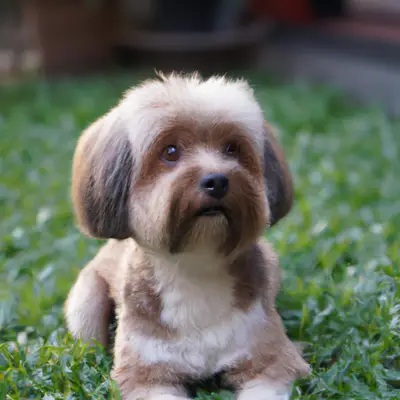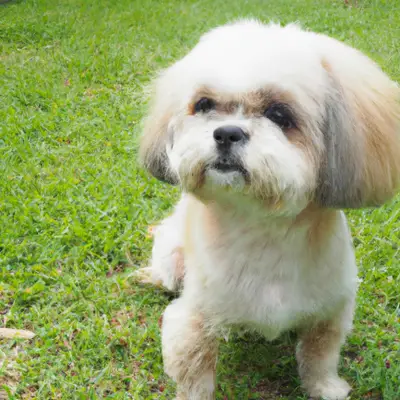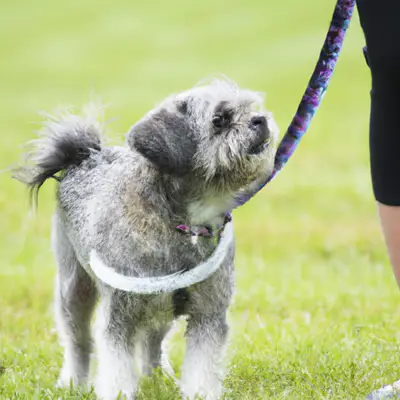
The Chi-Poo, a delightful hybrid breed that combines the best qualities of the Chihuahua and Poodle, has rapidly gained popularity among dog lovers worldwide. Known for its intelligence, affection, and energy, the Chi-Poo is a perfect companion for families and individuals looking for a small, low-shedding, and adaptable dog.
Whether you’re considering adding a Chi-Poo to your family or want to learn more about this captivating canine, Learn everything you need about this delightful designer breed.
| Parent Breeds | Chihuahua & Poodle |
| First Cross Date | 1990s |
| Average Height | 5-15 inches |
| Average Weight | 2-9 kg (5-20 lbs) |
| Life Span | 12-15 Years |
| Colors | White, Cream, Black, Brown, Grey, Apricot & Mix |
| Popular Names | Chi-Poo, Chipoo, Poochi, Chidoodle, Chihuahua Poodle mix. |
| Temperament | Playful, Friendly, Caring, Intelligent |
| Coat Texture | Curly or Wavy |
| Temperature Tolerance | Sensitive to extreme temperatures |
| Sheading Nature | Year-round (Moderate) |
| Energy Level | Moderate |
| Social/Attention Needs | High |
| Grooming Frequency | Monthly |
This comprehensive guide will explain the history, appearance, temperament, health, and care requirements of the captivating Chi-Poo.
Keep Reading!!
Chi-Poo Breed Overview
- Chi-Poo is a mixed breed between a Chihuahua and a Poodle, also known as Choodle or Poochi.
- They are small-sized dogs, with adult weights typically ranging between 5-20 pounds.
- Their coat can be curly or wavy, with varying lengths and colors, often low-shedding due to the Poodle influence.
- Chihuahua poodle mix are generally intelligent and easy to train due to their Poodle heritage.
- They tend to be affectionate, loving and enjoy being around people and other pets.
- ChiPoos have moderate energy levels and require regular exercises, such as daily walks or playtime.
- They adapt well to various living environments, making them suitable for apartments and houses.
- Prone to specific health issues, such as dental problems, patellar luxation, and eye issues, which can be minimized through regular vet check-ups and proper care.
- They make good family pets and companions, especially for seniors and individuals with allergies due to their low-shedding coats.
Parent Breeds
Chihuahua
The Chihuahua is a small dog breed known for its petite size, large ears, and big personality. Originating in Mexico, the breed is named after the Mexican state of Chihuahua, where it was first discovered and popularized. The history of the Chihuahua is fascinating, with connections to ancient civilizations and modern culture.

The Chihuahua’s history can be traced back to Mexico’s ancient civilizations between the 9th and 12th centuries. At that time, this breed was called Techichi.
The shorthaired Chihuahua we know today was discovered in the 1850s in the Mexican state of Chihuahua. In the 19th century, this breed gained popularity among canine lovers.
American visitors took an interest in these small dogs and began to bring them back to the United States. Their popularity grew, and the American Kennel Club (AKC) officially recognized the breed in 1904.
The Chihuahua’s small size, unique appearance, and spirited personality have endeared it to pet owners worldwide.
Poodle
Chi-Poo Breed History
The “ChiPoo” name was coined in the 1990s to describe the intentional crossbreeding of two purebred dogs. As a designer breed, the Chidoodle has become increasingly popular over the past couple of decades.

The goal of designer breeds is to combine the best traits of both parent breeds purebred chihuahua and toy poodle, resulting in a dog with superior qualities.
The exact origin of the Chi-Poo is unknown. However, historians believe the hybrid breed was likely developed sometime in the 1970s in the United States when breeders intentionally crossbred purebred dogs to create new breeds with specific traits.
This was part of a more significant trend, which saw the rise of several other designer crossbreeds, such as the Doxiepoo and the Bordoodle.
The Chi-Poo is not recognized by known breed registries like the American Kennel Club (AKC) or the United Kennel Club (UKC) as a designer breed.
However, the breed is recognized by some smaller organizations, such as the American Canine Hybrid Club (ACHC), Designer Dogs Kennel Club (DDKC), International Designer Canine Registry (IDCR) and the Designer Breed Registry (DBR).
Vital Stats

- Average Weight: 2-9 kg (5-20 lbs)
- Average Height: 5-15 inches
- Average lifespan: 12-15 Years
- Breed Group: Mixed breed dogs
Appearance
The ChiPoo puppy inherits physical traits from Chihuahuas and Poodles, resulting in a diverse range of appearances. Generally, Chi-Poos are small dogs, standing between 5 to 15 inches tall and weighing 2-9 kg (5-20 lbs).
They have a slender yet sturdy build, rounded heads, dark almond-shaped eyes, and a black or brown nose. Their ears may be floppy like a Poodle’s or erect like a Chihuahua’s.
These energetic dogs can have various coat types, depending on which parent breed’s genes are more dominant. Their coat may be short and smooth like a Chihuahua’s, curly and dense like a Poodle’s, or a combination of the two. Coat colors vary widely and include black, white, cream, brown, apricot, or a combination of these shades.
Temperament
The Chi-Poo’s temperament is a delightful blend of the Chihuahua’s dynamic nature and the Poodle’s intelligence and affection. These dogs are energetic and playful and enjoy engaging in fetch or agility training activities. They are also intelligent and trainable, responding well to positive reinforcement techniques and consistent training.
Poochis are loving and loyal companions, forming strong bonds with their families. They can be protective and may be initially cautious around strangers or other dogs. Early socialization is essential to ensure a well-rounded and confident pet.
Care & Grooming
Chi-Poos have varying grooming requirements depending on their coat type. For short, smooth coats, weekly brushing is sufficient to remove loose hair and prevent matting. More frequent brushing and occasional professional grooming may be necessary for curly or wavy coats to maintain a healthy coat.
Other routine care includes regular nail trimming, ear cleaning, and dental care. They are adaptable canines who thrive in urban and suburban environments with sufficient exercise and mental stimulation.
Daily walks, playtime, and interactive toys are essential for a happy and well-adjusted Chi-Poo.
Exercise & Training
Although small, the ChiPoo is an energetic breed that requires daily exercise to stay healthy and content. A combination of daily walks, play sessions, and mental stimulation through puzzle toys or training games is ideal.
Due to their intelligence, Chihuahua Poodle mix excel at obedience and agility training, which can be a fun way to bond with your dog and keep them engaged.
Regarding training, the Chi-Poo benefits from consistent, positive reinforcement methods. Early socialization and exposure to various environments, people, and animals will help your furry friend become a well-adjusted and confident adult dog.
Due to their strong bond with their families, they may be prone to separation anxiety, so crate training and gradually increasing time alone can be beneficial in preventing such issues.
Feeding & Nutrition
As a small breed, the Chi-Poo requires a balanced diet formulated specifically for their size, age, and activity level. High-quality dog food, divided into two or three smaller meals per day, is recommended to prevent the risk of hypoglycemia, a condition to which small breeds like the Chi-Poo can be susceptible.
Be cautious about overfeeding, as obesity can lead to numerous health problems in dogs. Regular checkups with your veterinarian will help ensure your puppy maintains a healthy weight and receives the proper nutrition.
Chi-Poo Pros & Cons
Pros
- Chi-Poos are small, making them suitable for apartment living and easy to transport.
- They are known for their loving and friendly personality, making them excellent companion pets.
- They typically have a low-shedding coat due to their Poodle lineage, making them more suitable for people with allergies.
- Chihuahuas and Poodles are intelligent breeds, and the ChiPoo often inherits this trait, making them easier to train.
- Chi-Poos can adjust to various living situations and are generally good with children and other pets if socialized properly.
- The mix of Chihuahua and Poodle gives the breed a distinct and often charming appearance.
Cons
- As a mixed breed, Chi-Poos can inherit health issues from either parent breed, such as patellar luxation or dental problems.
- Due to their small size, they can be more susceptible to injuries, so caution should be taken when handling them or when they are around more prominent animals.
- Chi-Poos may require more exercise than other small breeds, which can be challenging for some owners.
- While intelligent, Chipoos may sometimes inherit the Chihuahua’s stubbornness, making them more challenging to train.
- They can be prone to excessive barking, which can be problematic for some households or living situations.
- The curly Poodle coat requires regular grooming to prevent matting, which can be time-consuming and costly if done professionally.
Health Requirements

1) Balanced Diet
A balanced diet is crucial for your Chi-Poo’s overall health. Choose high-quality dog food for their size, age, and activity level. Avoid overfeeding to prevent obesity, which can exacerbate health problems.
2) Dental Care
Designer mixed breed dogs can be prone to dental issues, including gum disease and tooth decay, due to their small size and crowded teeth. Regular teeth brushing, chews, and annual dental cleanings at the vet can help maintain good oral health.
3) Exercise
Chi-Poos is an active and energetic breed. Regular physical activity is essential for maintaining a healthy weight, preventing boredom, and reducing behavioral issues. Aim for at least 30 minutes of exercise daily, including walks, playtime, or indoor games.
4) Mental Stimulation
Chidoodles are intelligent and need mental stimulation to stay engaged and prevent boredom. Interactive toys, puzzle games, and obedience training can help keep their minds sharp.
5) Grooming
Regular grooming is essential to maintain a healthy coat and prevent matting. Brush your pet’s coat several times a week and have them groomed professionally every 6-8 weeks if needed. Trim their nails regularly, and check and clean their ears to prevent infections.
6) Parasite Prevention
Chi-Poos, like all dogs, are susceptible to internal and external parasites such as fleas, ticks, and heartworms. Use veterinarian-recommended preventative treatments to keep your pet healthy and protect them from these harmful pests.
7) Vaccinations
Puppies should receive core vaccinations (e.g., distemper, parvovirus, and hepatitis) and non-core vaccinations based on lifestyle and regional risks (e.g., leptospirosis, Lyme disease). Discuss with your vet to determine the appropriate vaccination schedule for your furry friend.
8) Genetic Testing
Since Chi-Poos can inherit health issues from their parent breeds, it’s essential to be aware of potential genetic risks. Testing for known genetic conditions, such as Legg-Calve-Perthes disease or von Willebrand’s disease, can help you and your vet take preventative measures and monitor your pet’s health more closely.
9) Regular Veterinary Check-Ups
Routine vet visits are essential for monitoring your Chi-Poo’s overall health, identifying potential health issues early, and keeping vaccinations up to date.
Puppies should be seen more frequently, while adult dogs should have at least one yearly check-up.
Food Requirements

1) High-Quality Dog Diet
Choose a high-quality dog food formulated for small breeds, as it will contain the right balance of nutrients and portion sizes suitable for your Chi-Poo. Look for dog food with high-quality protein sources, whole grains, and healthy fats.
2) Age-Appropriate Food
Select a dog food appropriate for your Poochi’s life stage (puppy, adult, or senior). Each stage has different nutritional requirements, so choosing food specifically designed for their current stage of life is essential.
3) Balanced Nutrients
Ensure that the dog food you choose provides a balanced mix of essential nutrients, including proteins, carbohydrates, fats, vitamins, and minerals.
Protein is vital for muscle development, while fats provide energy and support a healthy coat.
4) Portion Control
Overfeeding can lead to obesity and related health issues, so it’s essential to feed your Chi-Poo the right portion size based on their weight, age, and activity level. Consult your vet or the dog food packaging for appropriate serving sizes.
5) Regular Feeding Schedule
Establish a consistent feeding schedule, offering meals simultaneously daily. Adult canines should be fed twice daily, while puppies may require more frequent meals to support their growth and development.
6) Limit Treats
Treats should be given sparingly and should not exceed 10% of your ChiPoo’s daily caloric intake. Choose healthy options, like small pieces of lean meats or dog-safe fruits and vegetables.
7) Monitor Weight
Regularly weigh your pooch and adjust their food intake to maintain an ideal weight. If you notice sudden weight changes or are unsure about your pet’s ideal weight, consult your vet.
8) Avoid Human Foods
Feeding your Chi-Poo table scraps or human food can lead to obesity and may introduce harmful ingredients. Stick to dog-safe treats and food designed specifically for canine consumption.
9) Food Allergies or Sensitivities
Some Chidoodles may develop food allergies or sensitivities. If you notice symptoms such as itching, digestive issues, or skin irritations, consult your vet to determine if a change in diet is necessary.
Grooming Requirements

1) Coat Brushing
Chi-Poos typically have a wavy or curly coat, which requires regular brushing to prevent matting and tangles. Aim to brush your pet’s coat at least 2-3 times weekly, using a slicker brush or comb designed for curly coats.
2) Bathing
Bathe your Chi-Poo every 4-6 weeks or as needed depending on their activity level and coat condition. Use a gentle, dog-safe shampoo formulated for sensitive skin or curly coats.
Rinse thoroughly to remove all soap residue, as leftover shampoo can cause skin irritation.
3) Haircuts
Depending on your ChiPoo’s coat type, they may require regular haircuts to keep their coat manageable and free from matting. Consult a professional groomer to determine your pet’s best haircut and grooming schedule. Generally, haircuts are needed every 6-8 weeks.
4) Nail Trimming
Regular nail trimming is essential for your Poochi’s comfort and prevents overgrown nails from causing pain or injury. Trim their nails every 3-4 weeks or as needed, using dog-safe nail clippers or a grinder.
5) Ears Cleaning
ChiPoos can be prone to ear infections, so it’s essential to regularly check and clean their ears. Use a gentle dog ear cleaning solution and a cotton ball to clean the outer ear, avoiding the ear canal.
Clean their ears at least once a month or more frequently if they have ear issues.
6) Dental Care
Dental health is essential for canines, as they are prone to dental issues due to their small size and crowded teeth. Brush your dog’s teeth several times weekly using dog-safe toothpaste and a soft-bristled toothbrush.
You can also provide dental chews and consider professional dental cleanings as your vet recommends.
7) Eyes Care
Keep the area around your furry friend’s eyes clean and free from discharge or debris. Use a damp cloth or a pet-safe eye wipe to gently clean the eye area, being careful not to touch the eye itself.
Monitor for any signs of eye irritation or infection and consult your vet if you notice any issues.
8) Anal Gland Expression
Some Chi-Poos may require occasional anal gland expression to prevent discomfort and potential infection. A professional groomer or veterinarian can do this during routine grooming appointments.
9) Regular Grooming Appointments
If you’re uncomfortable performing some grooming tasks at home, or your Chi-Poo requires more advanced grooming, schedule regular appointments with a professional groomer. This will help maintain your pet’s appearance and overall health.
10) Grooming Tools
Invest in high-quality grooming tools for your Chidoodle’s coat type, such as slicker brushes, combs, nail clippers, and scissors. Proper tools will make grooming more efficient and comfortable for you and your pet.
Training Requirements

1) Early socialization
Begin socializing your ChiPoo as a puppy to expose them to various environments, people, and other animals. Early socialization helps prevent fearfulness or aggression and ensures your dog is well-adjusted to various situations.
2) Basic Obedience
Teach your Chi-Poo basic obedience commands. This will help establish you as the leader, improve communication, and make it easier to manage your dog in different situations.
3) Crate Training
Crate training your Chi-Poo provides them with a safe space and can assist with housebreaking, travel, and reducing separation anxiety. Start crate training early and use positive reinforcement to make the crate a positive environment.
4) Housebreaking
Potty training your pet is essential for maintaining a clean home and preventing accidents. Establish a consistent schedule for taking your dog outside and use positive reinforcement when they successfully eliminate outdoors.
Be patient, as housebreaking can take time, especially with small breeds.
5) Leash Training
Teach your pet to walk calmly on a leash without pulling or lunging. Start with short walks and gradually increase the distance and duration as your dog becomes comfortable with the leash.
Use positive reinforcement and treats to reward good behavior.
6) Barking Control
Chihuahua Poodle mix can be prone to excessive barking. Train your dog to understand the “quiet” command and provide consistent reinforcement when they stop barking. Address any underlying causes of excessive barking, such as boredom or anxiety.
7) Mental Stimulation
Chipoos are intelligent dogs that require mental stimulation to prevent boredom and related behavioral issues. Incorporate puzzle toys, interactive games, and trick training into your dog’s routine to engage them mentally.
8) Consistency
Consistency is critical when training your canine. Stick to the same commands, signals, and rewards to prevent confusion and ensure success. Involve all family members in the training process to maintain consistency across the board.
9) Positive Reinforcement
Use positive reinforcement techniques, such as praise, treats, and affection, to reward your pooch for good behavior. This approach is more effective and fosters a stronger bond between you and your pet.
10) Professional Training Help
Consult a professional dog trainer or behaviorist if you encounter training or behavioral issues. They can provide guidance, tailored training techniques, and support to help you and your pet achieve a harmonious relationship.
Chi-Poo Health Issues
As a hybrid breed, the Chi-Poo may inherit health issues from either parent breed. Some common health concerns to be aware of include the following:
- Patellar luxation
- Hip dysplasia
- Eye problems, such as progressive retinal atrophy (PRA)
- Dental issues
- Hypoglycemia
- Allergies
Chi-Poo Mixed Dog Breed Pictures






FAQ
Chi-Poos can be good family pets because they are affectionate and friendly. Early socialization and proper training ensure they get along well with children and other family members.
Yes, Chipoos can make great family pets when properly socialized and trained. Their friendly, affectionate nature makes them suitable companions for families with or without children.
Chipoos need about 30 minutes of exercise daily, including walks, playtime, or indoor games. They are an active and energetic breed despite their small size.
Yes, Chipoos can get along with other dogs, especially when socialized from a young age. Proper introductions and supervision are essential to ensure positive interactions.
Chi-Poos can be fussy eaters, but this varies between individual dogs. A high-quality, balanced diet and consistent feeding schedule can help prevent picky eating habits.
Chipoos can be suitable for first-time dog owners, as they are generally friendly and trainable. However, new owners need to invest time in proper training, socialization, and addressing any potential stubbornness inherited from the Chihuahua side of their lineage.
Chipoos need regular grooming to maintain their coat’s health and appearance. This includes brushing 2-3 times per week, bathing every 4-6 weeks, and regular haircuts, nail trimming, and ear cleaning.
Chi-Poos can inherit health issues from their parent breeds, such as patellar luxation, dental problems, and heart issues. Regular veterinary check-ups, a balanced diet, and proper care can help minimize the risk of health problems.



